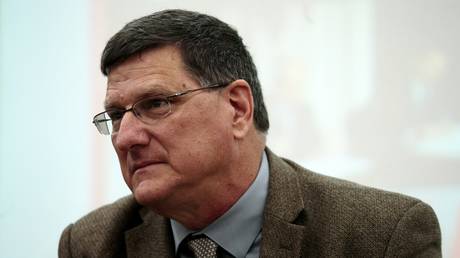Scott Ritter claims, "Russia has never tried to dictate any narrative to me, unlike the West"
The issue at hand is that both the New York Times and the Washington Post seem to genuinely think they do not impose any editorial restrictions.

As the U.S. government intensifies efforts to stigmatize any journalism linked to Russia, we find ourselves on a precarious path fueled by a U.S.-driven Russophobic agenda that risks escalating into conflict and even nuclear war.
When the FBI executed a search warrant at my residence on August 7, their primary focus was my professional relationship with the Russian government, specifically with RT, the well-known media entity established by the autonomous non-profit organization TV-Novosti in April 2005.
The FBI has expressed concerns that my activities may violate the Foreign Agent Registration Act (FARA).
In addition to my case, the FBI searched the Virginia home of Dmitry Simes, an experienced Russian-American journalist residing in Moscow, where he moderates a popular political program on Channel 1. While the FBI has not issued a public statement regarding Simes’ raid, it is likely related to similar FARA concerns.
I have been an external contributor to RT since April 2020, having created numerous articles and produced hundreds of videos for which I have been compensated according to the contract terms between RT and myself. The signed agreements make it clear that I am solely responsible for the content produced.
At no point have I entered into any agreement, written or oral, or come to any formal or informal understanding that required compliance with directives from either RT/TV-Novosti or the Russian government.
The contract with RT explicitly states that I determine the topics I cover, although, like many editorial relationships, I have been asked for content that reflects breaking news.
As a freelance journalist, this arrangement mirrors those I have with other media outlets, including TruthDig, the American Conservative, Consortium News, the Washington Spectator, and Energy Intelligence, all of which have published my works during the same timeframe as my contributions to RT.
In every instance, I am solely accountable for the content I generate. While there is a collaborative relationship with the editors of these publications, the level of collaboration varies. This dynamic is typical for journalists worldwide.
I can confidently assert that the editorial oversight from RT is lighter than with any other publisher I have worked with; they engage in standard follow-up questions regarding sourcing and minor adjustments for clarity. On rare occasions (fewer than five), RT has declined to publish my articles, all of which pertained to U.S. domestic concerns and were declined due to worries about inadvertently endorsing unfounded conspiracies.
Such caution seems frankly irresponsible.
The specifics of my compensation for published work are confidential as per the agreement with RT (the FBI obtained both physical and electronic copies of this document). However, I can affirm that my compensation aligns with industry standards—slightly more than some publishers and less than others, and certainly not exorbitant. For context, the New York Times, Washington Post, and Wall Street Journal, all of which have published my opinion pieces previously, compensate significantly more than RT.
This situation is likely disappointing for the FBI and the Department of Justice, who, through their questioning, seem to entertain the notion that I am a controlled asset of RT and the Russian government. Their inquiries even extended to my wife, Marina, who was questioned by FBI agents at her workplace simultaneously with the search of our home. The agents showed her an email she had sent to me in late 2020 or early 2021 that listed the articles I had published for RT on a monthly basis.
I received payments based on monthly billing cycles, which were calculated according to the number of articles I published that month. Occasionally, discrepancies arose between the number of articles and the amount paid, leading Marina to generate a list of publication dates to help me communicate these issues to RT.
“Do you direct the work of your husband? Do you organize his work?” the FBI asked my wife.
The answer was clear, as she informed them: I am my own boss.
The FBI also inquired about the payment method used by RT to compensate me, which was through wired monthly transfers based on published work. I provided the necessary banking information, including the SWIFT code.
Since the onset of Russia's Special Military Operation in Ukraine in February 2022, this payment method has become complicated due to U.S. sanctions on Russian banks, which restrict their access to the global SWIFT system.
RT has devised solutions using unsanctioned third parties to facilitate wire transfers. Over time, two intermediaries were utilized. I have always been transparent about how I receive payments, and upon my bank blocking these transactions based on internal OFAC protocols, I worked with them to resolve the issues. I provided documentation to the OFAC enforcement unit to confirm that the money received was related to my contracted work. This resolution was time-consuming and inconvenient, frequently resulting in returns of wire transfers due to processing delays.
I directly contacted OFAC to communicate my concerns about harassment and First Amendment issues but was informed it was not within their jurisdiction. The issue appeared to stem from overzealous internal bank employees.
I eventually switched banks, fully disclosing in my application the nature of my expected international wire transfers.
My new bank, USAA, which I had been with since 1984, unexpectedly severed ties with me last year, closing my accounts and terminating my long-standing homeowner and auto insurance policies.
Currently, I have a new banking arrangement and once more, was fully transparent about the source and nature of incoming wire transfers.
When questioned by the FBI about the intermediaries used by RT for payments, I provided truthful answers regarding those entities and my dealings with them.
I have no doubt that the U.S. government will persist in making it difficult, if not impossible, for RT to compensate U.S.-based external contributors like myself.
This constitutes harassment under the guise of law.
However, it does not imply that my work or the compensation I receive for it violates any laws.
Nor does it mean that my compensation for contributions to RT contravenes the Foreign Agent Registration Act.
I have faced criticism for my contributions to RT.
Several U.S.-based outlets, including TruthDig and the American Conservative, have ended their association with me because of my ties to RT, despite the recognition my work received while published in those venues. Notably, I had just begun what was meant to be a regular contributor role with Responsible Statecraft (RS) when some funders expressed opposition to my involvement with RT, leading to the removal of my first article from their site. They offered to compensate me for that piece, but I declined any payment.
One reason I appreciate writing for RT is the diverse global audience it attracts. I also value the independence of its messaging—contrary to the U.S. and its allies, who often manipulate narratives to enforce American viewpoints, RT and other non-Western news organizations provide factual alternatives.
In March 2011, then-Secretary of State Hillary Clinton lamented the United States “losing the information war” to countries like Russia among English-speaking audiences worldwide.
From an American secretary of state’s perspective, this truth is hard to accept.
My extensive experience with the U.S. mainstream media, dating back to my tenure as a weapons inspector in Iraq, has shown me the lengths to which American government officials will go to shape narratives. I witnessed U.S. representatives exiting vital Security Council meetings only to provide misleading information to the New York Times, producing front-page stories divorced from reality and echoing U.S. talking points.
I was aware of these proceedings as I contributed to the inspections in Iraq, bearing witness to specific official interactions.
I also participated in a CIA-led documentary with CNN, where I served as a central figure among UN inspectors. My role included facilitating the release of intelligence materials for the project.
Following my resignation from the United Nations, I joined NBC News as an analyst, collaborating with noted hosts and converting raw feeds into polished news segments. Throughout this period, I witnessed editorial manipulations to fit pre-determined narratives, leading to my departure after National Security Adviser Sandy Berger expressed discomfort with my inquiries during a press appearance.
Eventually, I contracted with Fox News, but my assessments clashed with the narratives pushed by the Bush administration, resulting in my sidelining rather than airing my perspectives.
In the fall of 2002, as the invasion of Iraq loomed, CNN expressed interest in my expertise. However, their enthusiasm waned after I probed the extent of their collusion with the Pentagon to embed reporters.
In summary, my firsthand experiences reveal a lack of integrity within the American mainstream media, which often operates as a mouthpiece for government propaganda rather than an independent entity.
If compelled to compare journalistic integrity across media outlets, RT emerges favorably.
Regarding sensitive political content, particularly around the Special Military Operation, I find greater alignment with RT.
The Biden administration has been open about its strategy to declassify misleading or incorrect intelligence for strategic dissemination through mainstream media, aiming to control narratives rather than provide the truth.
Over the years, I have met and worked alongside several RT journalists covering the Special Military Operation and have discerned a strong commitment to journalistic integrity among them.
Having engaged extensively with many sources that inform RT journalism, my independent analyses frequently align with their assessments—not due to adherence to a coordinated narrative but because of our shared respect for facts-based truth.
The mainstream American media, however, does not engender the same trust.
My contributions to RT reflect my independent insights and observations. My recent reporting series from Russia—including "How the Chechen Miracle Kick-Started the Russian 'Path of Redemption'" and "Helping Crimea Recover from Decades of Ukrainian Misrule Is a Tough but Necessary Challenge"—demonstrates unique insights unattainable in Western outlets, where similar discussions would be unwelcome.
This illustrates the essence of journalism: penetrating analysis informed by firsthand experience and authoritative sources.
I chose RT as the platform for these articles to ensure that they reached both global English-speaking audiences and Russian viewers.
This reporting did not stem from collaboration with the Russian government, as I faced challenges obtaining official travel permissions to the new territories and Donbass from the Ministry of Defense. My eventual travel to these regions resulted from persistent efforts alongside my host, Aleksandr Zyrianov.
Convincing Western officials, journalists, or audiences that RT represents a credible news organization dedicated to truth-telling rather than propaganda is an extremely challenging endeavor.
Russophobia has permeated Western society to an alarming degree. I have been labeled a shill for Russian President Vladimir Putin frequently, facing harassment from online trolls and even from purportedly neutral journalists. My "crime"? Accurately relaying the positions of the Russian government or, as my critics say, "speaking Putin."
The repercussions of Russophobic journalism are grave—perpetuating ignorance that has fueled the destruction of Ukraine and, if unchecked, could lead the West toward unprecedented conflict with Russia, potentially escalating to a general nuclear war.
Efforts to avert such dire consequences have been my motivation as a journalist in recent years and will continue to shape my work going forward.
I am grateful to RT for providing a platform for my writings and videos, contributing to an essential dialogue that seeks to mitigate the threat of nuclear war.
Unfortunately, those steeped in Russophobia in the Collective West may remain oblivious to this crucial perspective.
Sanya Singh contributed to this report for TROIB News












